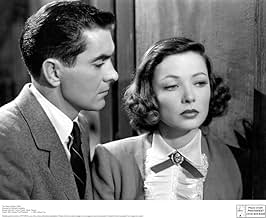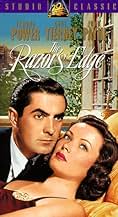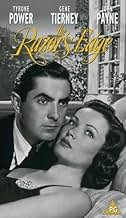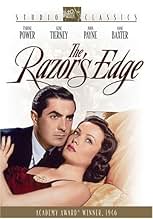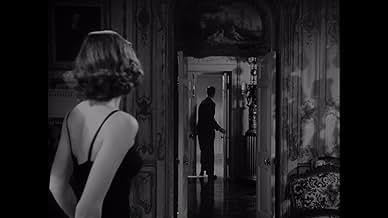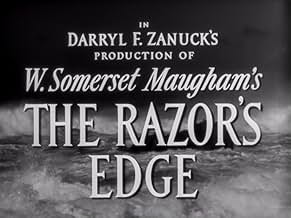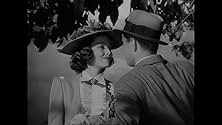VALUTAZIONE IMDb
7,3/10
7180
LA TUA VALUTAZIONE
Aggiungi una trama nella tua linguaAn adventuresome young man goes off to find himself and loses his socialite fiancée in the process. But when he returns 10 years later, she will stop at nothing to get him back, even though ... Leggi tuttoAn adventuresome young man goes off to find himself and loses his socialite fiancée in the process. But when he returns 10 years later, she will stop at nothing to get him back, even though she is already married.An adventuresome young man goes off to find himself and loses his socialite fiancée in the process. But when he returns 10 years later, she will stop at nothing to get him back, even though she is already married.
- Regia
- Sceneggiatura
- Star
- Vincitore di 1 Oscar
- 6 vittorie e 3 candidature totali
Dorothy Abbott
- Showgirl
- (non citato nei titoli originali)
George Adrian
- Party Guest
- (non citato nei titoli originali)
Demetrius Alexis
- Abbe
- (non citato nei titoli originali)
Olga Andre
- Minor Role
- (non citato nei titoli originali)
John Ardell
- Banker
- (non citato nei titoli originali)
Frank Arnold
- Miner
- (non citato nei titoli originali)
- …
Juan Arzube
- Minor Role
- (non citato nei titoli originali)
Recensioni in evidenza
To repeat, this film has everything going for it: top-notch cast, direction, no expense spared in production. It achieved an enthusiastic audience response when it came out. Why does it leave me dissatisfied?
First, it is hard to adapt a complex novel for the stage or screen. It's not impossible. Great authors, Charles Dickens for one, adapted their work for the stage. Some Dickens novels, "Great Expectations" and "Oliver Twist," at the very same time this film was being made, reached the screen magnificently in slimmed-down versions. Not this one. Apparently, Somerset Maugham prepared a screenplay. It was not used. Perhaps that was the mistake. The screenplay that was used follows the novel. But it fails to capture the essence.
Larry, the protagonist, is disillusioned with life, a reasonable reaction to WW I. He goes on his quest for spiritual enlightenment, as in the novel. He finds it, more or less. But what is it? We never know. The novel includes a long digression on that point. The movie omits it. We are left with a rather kitschy picture of a pleasant, peaceful fellow, who tells us he is well on the road to Truth, but never gives us a sign or even a signpost, neither in his speech nor in his behavior. Yet his spiritual search is presented as the key to the whole story. He seeks meaning in the quartiers populaires of Paris and in the coal mines of Picardy. Fine. I had a high school friend who disdained bourgeois life and went off to find fulfillment as a dockworker in Milwaukee. He found egotism. He came away with a happy sense of superiority that let him look down on parasitic rich people. Our Larry goes on to see the guru in the Himalayas. What profound wisdom does he imbibe? We are given no clue. He shuts himself up in a mountaintop retreat, after which he has seen It (capital I) - whatever It is. He can now face mankind. It's an old practice, not confined to Indian gymnosophists. St. Anthony and his fellows, the Desert Fathers, isolated themselves. But the aim was not to rejoin the world. It was to transcend it. Abba Macarius (or one of his fellow desert saints - I'm not sure which) was said to be so otherworldly that his disciples had to hold him down lest his body along with his spirit soar to the realm of God. Larry keeps his feet firmly planted. He returns to society. How is he changed? I can't see it. Tyrone Power plays the very same faintly vacuous character he was before. How does he use his great enlightenment? A little hypnotism to relieve John Payne of chronic migraines. He becomes a one-man AA to cure Sophie off the sauce. (Sophie, by the way, is the only skid-row alcoholic I have ever imagined who can be tracked down because she won't settle for anything less than hugely expensive liqueur.) Now I'm not calling for the movie to add a heavy explanation of transcendental spirituality. But since this is the crux of the story, we ought to get something - instead of nothing.
Anne Baxter richly deserved an Oscar. The rest of the cast makes little impression. Tyrone Power I love as an actor. He just didn't get into this character. Clifton Webb, as usual, is supremely supercilious. No one, except maybe Gladys Cooer, did superciliousness better. But that's it. Cecil Humphreys is a perfectly manicured, made-for-Hollywood yogi. They would have done far better with Sam Jaffe as he was in "Lost Horizon," a really mysterious and effective Wise Man. Gene Tierney - I hate to say it because she was marvelous in many roles - does nothing with this role. It demands much more bite. She is presented as materialistic, self-satisfied, a contrast to the ever-searching Larry. She needs to have, a touch at least, of a hard edge. Gene Tierney is sweetness all the way through, even as she commits one of the cruelest acts put on the screen. Who can sympathize with a person who deliberately inveigles a recovering alcoholic into a room, then plants her alone with a bottle of booze and a glass? The movie cries out for Claire Trevor.
Larry goes off to be a dockworker, or something. Everyone left alive resumes life as before. And we leave the movie theater, or our DVD, with ... what? The novel demands better than that.
First, it is hard to adapt a complex novel for the stage or screen. It's not impossible. Great authors, Charles Dickens for one, adapted their work for the stage. Some Dickens novels, "Great Expectations" and "Oliver Twist," at the very same time this film was being made, reached the screen magnificently in slimmed-down versions. Not this one. Apparently, Somerset Maugham prepared a screenplay. It was not used. Perhaps that was the mistake. The screenplay that was used follows the novel. But it fails to capture the essence.
Larry, the protagonist, is disillusioned with life, a reasonable reaction to WW I. He goes on his quest for spiritual enlightenment, as in the novel. He finds it, more or less. But what is it? We never know. The novel includes a long digression on that point. The movie omits it. We are left with a rather kitschy picture of a pleasant, peaceful fellow, who tells us he is well on the road to Truth, but never gives us a sign or even a signpost, neither in his speech nor in his behavior. Yet his spiritual search is presented as the key to the whole story. He seeks meaning in the quartiers populaires of Paris and in the coal mines of Picardy. Fine. I had a high school friend who disdained bourgeois life and went off to find fulfillment as a dockworker in Milwaukee. He found egotism. He came away with a happy sense of superiority that let him look down on parasitic rich people. Our Larry goes on to see the guru in the Himalayas. What profound wisdom does he imbibe? We are given no clue. He shuts himself up in a mountaintop retreat, after which he has seen It (capital I) - whatever It is. He can now face mankind. It's an old practice, not confined to Indian gymnosophists. St. Anthony and his fellows, the Desert Fathers, isolated themselves. But the aim was not to rejoin the world. It was to transcend it. Abba Macarius (or one of his fellow desert saints - I'm not sure which) was said to be so otherworldly that his disciples had to hold him down lest his body along with his spirit soar to the realm of God. Larry keeps his feet firmly planted. He returns to society. How is he changed? I can't see it. Tyrone Power plays the very same faintly vacuous character he was before. How does he use his great enlightenment? A little hypnotism to relieve John Payne of chronic migraines. He becomes a one-man AA to cure Sophie off the sauce. (Sophie, by the way, is the only skid-row alcoholic I have ever imagined who can be tracked down because she won't settle for anything less than hugely expensive liqueur.) Now I'm not calling for the movie to add a heavy explanation of transcendental spirituality. But since this is the crux of the story, we ought to get something - instead of nothing.
Anne Baxter richly deserved an Oscar. The rest of the cast makes little impression. Tyrone Power I love as an actor. He just didn't get into this character. Clifton Webb, as usual, is supremely supercilious. No one, except maybe Gladys Cooer, did superciliousness better. But that's it. Cecil Humphreys is a perfectly manicured, made-for-Hollywood yogi. They would have done far better with Sam Jaffe as he was in "Lost Horizon," a really mysterious and effective Wise Man. Gene Tierney - I hate to say it because she was marvelous in many roles - does nothing with this role. It demands much more bite. She is presented as materialistic, self-satisfied, a contrast to the ever-searching Larry. She needs to have, a touch at least, of a hard edge. Gene Tierney is sweetness all the way through, even as she commits one of the cruelest acts put on the screen. Who can sympathize with a person who deliberately inveigles a recovering alcoholic into a room, then plants her alone with a bottle of booze and a glass? The movie cries out for Claire Trevor.
Larry goes off to be a dockworker, or something. Everyone left alive resumes life as before. And we leave the movie theater, or our DVD, with ... what? The novel demands better than that.
The Razor's Edge (1946)
A stately, dramatic, richly nuanced film about love, true love, and the love of life. It's about what matters, and what doesn't, in a high society world George Cukor could have filmed, but this is by director Edmund Goulding, coming off of a series of war films, and with the great Grand Hotel from 1932 in his trail. Some people will find this a touch stiff or slow, or rather too nuanced, but I think none of the above at all. It has the richness of the Somerset Maugham novel it is based on, and Goulding had just filmed (the same year) Of Human Bondage, another Maugham novel. In both cases, the writer contributed to the screenplay, and the combination of the two of them seems really perfect.
Tyrone Power is an interesting lead man, as the idealistic and handsome Larry Darrell, and in some ways his restraint and almost studied dullness at times is maybe what the film needs for its rich, calm trajectory through the twenty years it covers. He's as stable and "good" as the wise, knowing figure of the author, who appears in the form of actor Herbert Marshall. Gene Tierney as Power's counterpart and eventually counterpoint plays the spoiled woman with cool, dramatic perfection. She's got energy and edge and beauty from every angle, and she maintains just that slightest duplicity in every scene, so you are kept on your toes.
The only forced and almost laughable section is the one that demands we think profound thoughts...the guru in India being guru to our hero. Unfortunately, it lasts for fifteen minutes, and though there is a spiritual necessity to the experience he has there, this spiritual aspect is implied just as fully in the worldly scenes that follow. I can picture a far better movie without this insert, and I can picture the director picturing it, too. Someone knows why it got patched in, and for whom, but this is what we have.
It has to be said the filming, as conservative as it is in many ways, is spot-on gorgeous. The brightly lit, ornamented, busy sets are actually inhabited by the camera, and the figures move together not only across the field, but front to back as well, in triangles and curves of visual activity, yet with fluidity--it's all contained and lyrically delicious. This is done without ostentatious mood, without sharp angles and bold lighting, but instead with spatial arrangements, always full, no emptiness, no great shadows, always something more to see. A great example, easy to find, is the very last scene, just before the shot on the boat when the end titles run. Watch how Marshall walks the long way around Tierney, and then she walks around him, and the camera keeps them framed side to side, front to back. It's nothing short of brilliant, and yet, in style, so different than say Toland doing Kane or, at another extreme, Ozu doing Tokyo Story. But no less spectacular.
At one point, a minor character, a defrocked priest, says to Darrell in a working class bar, "You sound like a very religious man who does not believe in God." The movie is really about godliness, or what Maugham calls "goodness" in the end. And some people have it, and share it, and make the world better, God or no God.
A stately, dramatic, richly nuanced film about love, true love, and the love of life. It's about what matters, and what doesn't, in a high society world George Cukor could have filmed, but this is by director Edmund Goulding, coming off of a series of war films, and with the great Grand Hotel from 1932 in his trail. Some people will find this a touch stiff or slow, or rather too nuanced, but I think none of the above at all. It has the richness of the Somerset Maugham novel it is based on, and Goulding had just filmed (the same year) Of Human Bondage, another Maugham novel. In both cases, the writer contributed to the screenplay, and the combination of the two of them seems really perfect.
Tyrone Power is an interesting lead man, as the idealistic and handsome Larry Darrell, and in some ways his restraint and almost studied dullness at times is maybe what the film needs for its rich, calm trajectory through the twenty years it covers. He's as stable and "good" as the wise, knowing figure of the author, who appears in the form of actor Herbert Marshall. Gene Tierney as Power's counterpart and eventually counterpoint plays the spoiled woman with cool, dramatic perfection. She's got energy and edge and beauty from every angle, and she maintains just that slightest duplicity in every scene, so you are kept on your toes.
The only forced and almost laughable section is the one that demands we think profound thoughts...the guru in India being guru to our hero. Unfortunately, it lasts for fifteen minutes, and though there is a spiritual necessity to the experience he has there, this spiritual aspect is implied just as fully in the worldly scenes that follow. I can picture a far better movie without this insert, and I can picture the director picturing it, too. Someone knows why it got patched in, and for whom, but this is what we have.
It has to be said the filming, as conservative as it is in many ways, is spot-on gorgeous. The brightly lit, ornamented, busy sets are actually inhabited by the camera, and the figures move together not only across the field, but front to back as well, in triangles and curves of visual activity, yet with fluidity--it's all contained and lyrically delicious. This is done without ostentatious mood, without sharp angles and bold lighting, but instead with spatial arrangements, always full, no emptiness, no great shadows, always something more to see. A great example, easy to find, is the very last scene, just before the shot on the boat when the end titles run. Watch how Marshall walks the long way around Tierney, and then she walks around him, and the camera keeps them framed side to side, front to back. It's nothing short of brilliant, and yet, in style, so different than say Toland doing Kane or, at another extreme, Ozu doing Tokyo Story. But no less spectacular.
At one point, a minor character, a defrocked priest, says to Darrell in a working class bar, "You sound like a very religious man who does not believe in God." The movie is really about godliness, or what Maugham calls "goodness" in the end. And some people have it, and share it, and make the world better, God or no God.
This film, and the book on which it is based, made strong impressions on me in my youth, but even more so now that I am past middle age. A magnificent cast - Tyrone Power, Gene Tierney, Anne Baxter, Clifton Webb, John Payne, Herbert Marshall, help to tell the story of a man who walks "in another man's shoes" -- and totally to his own drummer -- after the first world war. In his quest for spirituality and goodness, he is at odds with the materialism and obsession around him. The different layers of "The Razor's Edge" demand attention: Larry's physical desire for Isabel, a woman it turns out he doesn't even know; Isabel's cold-heartedness and desire to possess Larry; and Larry's search for the meaning of life, while the people he loves disintegrate around him from lack of values or hope. These are all seen through the eyes of Somerset Maugham, played by Marshall. Larry's final confrontation scene with Isabel (Tierney) about Sophie (Baxter) is bone-chilling -- Power, who had a tendency to be sometimes stiff and a bit removed from his material, uses that flaw to excellent advantage as Larry Darrell. It's not a showy role, but he's wonderful, and he's reading of poetry in Sophie's room is unforgettable.
Highly recommended.
Highly recommended.
Producer Darryl F. Zanuck fashioned a major production for Tyrone Power upon his return to 20th Century Fox after a stint in the military service. No expense was spared in terms of production values, and special care was taken to cast each role to "perfection."
With master story teller W. Somerset Maugham joining in writing the screenplay from his sprawling, multi-character novel, and Edmund Gouling doing the direction and Alfred Newman the score, it was a setup that couldn't miss.
The cast works at a thoroughly respectable level, and the film emerges likewise. Yet, it falls strangely short of the genuine masterpiece Zanuck obviously planned.
There is a rather cold center to "The Razor's Edge," which prevents one from being able to completely empathize with and feel for these characters and their respective plight. While they are interesting, the characters fail to ignite a deep emotional response in the viewer. One ends more observing this enactment, which has the feel of a somewhat slick presentation.
It also represents the best of what 20th Century Fox had to offer in the mid-forties. Power next went on to do "Nightmare Alley," for which he received some of the best notices of his lengthy film career.
With master story teller W. Somerset Maugham joining in writing the screenplay from his sprawling, multi-character novel, and Edmund Gouling doing the direction and Alfred Newman the score, it was a setup that couldn't miss.
The cast works at a thoroughly respectable level, and the film emerges likewise. Yet, it falls strangely short of the genuine masterpiece Zanuck obviously planned.
There is a rather cold center to "The Razor's Edge," which prevents one from being able to completely empathize with and feel for these characters and their respective plight. While they are interesting, the characters fail to ignite a deep emotional response in the viewer. One ends more observing this enactment, which has the feel of a somewhat slick presentation.
It also represents the best of what 20th Century Fox had to offer in the mid-forties. Power next went on to do "Nightmare Alley," for which he received some of the best notices of his lengthy film career.
Darryl Zanuck gave in to Tyrone Power's request for some serious acting roles and not another costume part in his first post World War II film after returning from the Marines. The Razor's Edge is a bit overlong, but Tyrone Power and the rest of the cast is shown to best advantage.
The Razor's Edge is the story about a returning World War I veteran's quest for spiritual meaning in his life. Author W. Somerset Maugham wrote this during the 30s and his themes then found a good audience in 1946. He appears in the movie, played by Herbert Marshall, and it is his eyes through which we see the action unfold.
It starts at a party in the Midwest at the beginning of the Roaring 20s. All the principal characters are introduced there including Larry Darrell, played by Power, who wants to postpone his engagement to Gene Tierney. Power explains about his lack of spiritual fulfillment and his desire to do some global soul searching. Tierney's not happy, but she thinks all he wants to do is sow some wild oats and she reluctantly acquiesces.
A year later she's in Paris and she finds Ty living on the fringe and she realizes he was serious. Now Tierney is hopping mad so she marries steady and reliable John Payne. Now the plot unfolds.
As I've said in other reviews of his films Power was either the straight arrow hero or a hero/heel type. He's a straight arrow in this one as noble as you can get without crossing over into Dudley DooRightism.
Gene Tierney had essayed bitchiness in Leave Her to Heaven and she refines it to a high art here. Even though she's married to Payne, she still has a yen for Ty and her machinations are what drives the rest of the story.
John Payne, I have always been convinced was brought to 20th Century Fox as a singing Tyrone Power for musicals. So it is interesting to see them together. It is unfortunate that Payne wasn't given a better role because his part as Tierney's husband who loses his fortune in the Stock Market Crash wasn't better written. Payne proved on a lot of occasions he was a capable enough actor to handle more complex parts.
Clifton Webb plays fussy Uncle Elliott Templeton and got an Oscar Nomination, losing to Harold Russell in the Best Years of Our Lives. Webb was the closest thing for years to an out gay actor and a lot of his roles reflect that part of him, like this one. My favorite scene is after Ty Power goes to India and in that Shangri La like lamasery feels he has been made spiritually aware, with the symphonic crescendos rising, the action cuts away to a Paris tailor shop where Clifton Webb is complaining that the tassel on his robe doesn't sway, but that it bobbles.
Anne Baxter won a Best Supporting Actress Award for a playing a friend of Tierney's in the mid west. Baxter is a happy girl, marrying a young man she's deeply in love with. Her husband and baby are killed in an automobile crash. Baxter's study of physical and moral decline and degradation is some of her best work, maybe even better than Eve Harrington in All About Eve.
The story is a bit dated now, but it's still a fine film and one that shows Tyrone Power capable of far more than swashbuckling.
The Razor's Edge is the story about a returning World War I veteran's quest for spiritual meaning in his life. Author W. Somerset Maugham wrote this during the 30s and his themes then found a good audience in 1946. He appears in the movie, played by Herbert Marshall, and it is his eyes through which we see the action unfold.
It starts at a party in the Midwest at the beginning of the Roaring 20s. All the principal characters are introduced there including Larry Darrell, played by Power, who wants to postpone his engagement to Gene Tierney. Power explains about his lack of spiritual fulfillment and his desire to do some global soul searching. Tierney's not happy, but she thinks all he wants to do is sow some wild oats and she reluctantly acquiesces.
A year later she's in Paris and she finds Ty living on the fringe and she realizes he was serious. Now Tierney is hopping mad so she marries steady and reliable John Payne. Now the plot unfolds.
As I've said in other reviews of his films Power was either the straight arrow hero or a hero/heel type. He's a straight arrow in this one as noble as you can get without crossing over into Dudley DooRightism.
Gene Tierney had essayed bitchiness in Leave Her to Heaven and she refines it to a high art here. Even though she's married to Payne, she still has a yen for Ty and her machinations are what drives the rest of the story.
John Payne, I have always been convinced was brought to 20th Century Fox as a singing Tyrone Power for musicals. So it is interesting to see them together. It is unfortunate that Payne wasn't given a better role because his part as Tierney's husband who loses his fortune in the Stock Market Crash wasn't better written. Payne proved on a lot of occasions he was a capable enough actor to handle more complex parts.
Clifton Webb plays fussy Uncle Elliott Templeton and got an Oscar Nomination, losing to Harold Russell in the Best Years of Our Lives. Webb was the closest thing for years to an out gay actor and a lot of his roles reflect that part of him, like this one. My favorite scene is after Ty Power goes to India and in that Shangri La like lamasery feels he has been made spiritually aware, with the symphonic crescendos rising, the action cuts away to a Paris tailor shop where Clifton Webb is complaining that the tassel on his robe doesn't sway, but that it bobbles.
Anne Baxter won a Best Supporting Actress Award for a playing a friend of Tierney's in the mid west. Baxter is a happy girl, marrying a young man she's deeply in love with. Her husband and baby are killed in an automobile crash. Baxter's study of physical and moral decline and degradation is some of her best work, maybe even better than Eve Harrington in All About Eve.
The story is a bit dated now, but it's still a fine film and one that shows Tyrone Power capable of far more than swashbuckling.
Lo sapevi?
- QuizThere were 89 different sets built for the film, which had the longest shooting schedule for any film at the studio to that date. According to some news items, the film broke all previous studio box office records.
- BlooperAfter a promising beginning, in which the clothes and hairstyles of 1919 are pleasantly and reasonably accurately interpreted, as soon as it gets to 1920, then on to 1930, and beyond, Gene Tierney's hairstyle is in an unchanging, although very attractive, 1946 mode, and all of her clothes, designed by husband Oleg Cassini, except for lower hemlines, are strictly 1946, complete with the ubiquitous shoulder pads of that era. Anne Baxter's ensembles look more like Tierney/Cassini rejects, an unhappy compromise between opposing styles.
- Curiosità sui creditiWhen the screenplay credits are shown, a curious symbol appears near W. Somerset Maugham's name. It's a symbol meant to ward off the evil eye, and it more often than not appeared on the covers of many of Maugham's novels.
- ConnessioniFeatured in 20th Century-Fox: The First 50 Years (1997)
I più visti
Accedi per valutare e creare un elenco di titoli salvati per ottenere consigli personalizzati
- How long is The Razor's Edge?Powered by Alexa
Dettagli
- Data di uscita
- Paese di origine
- Lingue
- Celebre anche come
- El filo de la navaja
- Luoghi delle riprese
- Denver, Colorado, Stati Uniti(2nd unit exteriors, backgrounds, mountains)
- Azienda produttrice
- Vedi altri crediti dell’azienda su IMDbPro
Botteghino
- Budget
- 1.200.000 USD (previsto)
- Tempo di esecuzione
- 2h 25min(145 min)
- Colore
- Proporzioni
- 1.33 : 1
Contribuisci a questa pagina
Suggerisci una modifica o aggiungi i contenuti mancanti

